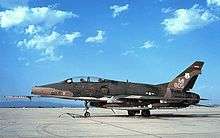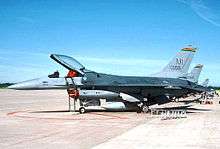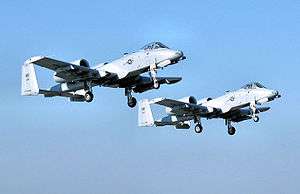127th Wing
| 127th Wing | |
|---|---|
|
107th Fighter Squadron A-10C Thunderbolt IIs
KC-135T Stratotanker 60-0346 171st Air Refueling Squadron | |
| Active | 15 January 1943–present |
| Country |
|
| Allegiance |
Template:Country data united states |
| Branch |
|
| Type | Wing |
| Role | Composite Close Air Support/Air Refueling |
| Part of | Michigan Air National Guard |
| Garrison/HQ | Selfridge Air National Guard Base, Detroit, Michigan |
| Nickname(s) | "Michigan Red Devils" "Michigan Six Pack" |
| Motto | "We stand ready" |
| Insignia | |
| 127th Wing emblem |
 |
| Aircraft flown | |
| Attack | A-10 |
| Tanker | KC-135T |
The 127th Wing (127 WG) is a composite unit of the Michigan Air National Guard, stationed at Selfridge Air National Guard Base, Michigan. If activated to federal service, elements of the wing are gained by the United States Air Force Air Combat Command, Air Mobility Command, and Air Force Special Operations Command.
The 107th Fighter Squadron, assigned to the Wings 127th Operations Group, is a descendant organization of the World War I 107th Aero Squadron, established on 27 August 1917. It was reformed on 7 May 1926, as the 107th Observation Squadron, and is one of the 29 original National Guard Observation Squadrons of the United States Army National Guard formed before World War II.
Overview
Flying two aircraft and supporting three Air Force Major Commands, the 127th Wing is one of the most complex units in the Air National Guard. As a component of the Michigan Air National Guard, the Wing has a dual state and federal role and stands ready to serve both at home and abroad.
the 127th Wing is composed of approximately 1,700 Citizen-Airmen and provides highly trained personnel and aircraft and support resources to serve the community, state and nation. The 127th Wing operates KC-135 Stratotankers, providing global aerial refueling capability in support of Air Mobility Command, and the A-10 Thunderbolt II, flying the close air support mission in support of Air Combat Command. The Wing also supports the Air Force Special Operations Command with its 107th Weather Flight.
Units
The 127th Wing is composed of five groups, each of which are composed of various flights and squadrons
- 127th Air Refueling Group (KC-135T Stratotanker)
- 171st Air Refueling Squadron
- 191st Operation Support Flight
- 191st Maintenance Squadron
- 191st Aircraft Maintenance Squadron
- 191st Maintenance Operations Flight
- 127th Operations Group
- 107th Fighter Squadron (A-10C Thunderbolt II)
- 127th Operation Support Flight
- 127th Maintenance Group (Supports the A-10 Mission)
- 127th Maintenance Squadron
- 127th Aircraft Maintenance Squadron
- 127th Maintenance Operations Flight
- 127th Mission Support Group
- 127th Civil Engineer Squadron
- 127th Security Forces Squadron
- 127th Logistics Readiness Squadron
- 127th Force Support Squadron
- 127th Communication Squadron
- 171st Aerial Port Flight
- 127th Medical Group
In addition to the five groups, the Wing includes the 107th Weather Flight, a highly skilled Special Tactics unit that has deployed to numerous contingencies and operations around the world.
History
The Wing's origins begin on 30 December 1942 with the establishment of the 360th Fighter Group at Grand Central Air Terminal, California. The mission of the 360th was the training of newly trained and later replacement fighter pilots for combat in P-38 Lightnings. Training was performed with four fighter training squadrons. Moved to several airfields in the Southern California region, the unit was disbanded in March 1944 when Army Air Force training units were re-designated as "Army Air Force Base Units".
In the spring of 1946 as part of establishing a new postwar Air National Guard, the 360th Fighter Group designation was changed to the 127th Fighter Group, and was allocated to the Michigan Air National Guard. The new Air National Guard unit received federal recognition and was activated on 29 September 1946. The 127th Fighter Group was assigned the 107th Fighter Squadron, 171st Fighter Squadron and 172d Fighter Squadron as its operational components.
At this time, the 107th and 171st were based at the Detroit Airport and the 172d was based at Battle Creek. Initially allocated F-51H Mustang propeller-driven fighters, in the spring of 1950 the Detroit units converted to F-84B/C Thunderjets, becoming the first units of the Michigan ANG to transition to jets.
During the Korean War, the 127th was federalized on 1 February 1951 and assigned to Air Training Command. The Detroit units (107th, 171st) being assigned to Luke Air Force Base, Arizona under Air Training Command. ATC equipped the group with d F-51, F-80, and F-84 aircraft and used it as a training organization. The 172d was moved to Selfridge AFB and was assigned to Air Defense Command, flying P-51H Mustangs. The wing was returned to state control on 1 November 1952 and the Detroit units returned to Detroit, the Battle Creek unit moving back to Kellogg Field. Aircraft assigned were F-51H, F-86E and F-89C.
Was realigned to Air Defense Command in November 1953 with the squadrons being equipped with F-89C Scorpion Interceptor. Its mission was the air defense of the southern Great Lakes area, including Chicago, Gary and Detroit. In September 1956, the 172d was expanded to a Group level, forming the 110th Fighter-Interceptor Group at Battle Creek. The 127th returned to Tactical Air Command in 1958, becoming a Tactical Reconnaissance Wing, flying RF-84F Thunderstreaks. In September 1962, the 171st was also expanded to a Group, forming the 191st Tactical Reconnaissance Group, although remaining at Detroit. The 127th and 191st TRG were both moved to the then active-duty Selfridge Air Force Base in 1971 due to traffic congestion at the Detroit-Wayne County airport. With the move to Selfridge, the obsolete RF-84s were retired and the 121st received newer RF-101C Voodoos.




In 1972, the 127th was upgraded to a Tactical Reconnaissance Wing, and the 107th was re-equipped with F-100D Super Sabre tactical fighters. In 1979 the 107th converted to the A-7D Corsair II with a mission of fighter-bomber support of ground combat forces and limited air superiority.
The 127th distinguished itself during the period from 1 June 1983 through 31 December 1984 and was awarded the Air Force Outstanding Unit Award. The Air Force recognized the unit for demonstrating a high degree of combat readiness and outstanding performance in all mission support. The 107th retired its A-7Ds in 1989 and was re-equipped with F-16A Fighting Falcons.
In 1996 in accordance with the Air Force's "One base, one wing policy, the 127th Fighter Wing and the 191st Airlift Group were merged into a composite unit. The 127th Wing combined the F-16 fighter elements of the 107th Fighter Squadron with the C-130 Hercules Transport 171st Airlift Group into a single unit, 127th Operations Group. The 191st Airlift Group being inactivated. This arrangement continued until 1999 when the 191st Airlift Group was re-activated as a component of the 127th Wing, the 127th OG retaining the F-16 Fighter-equipped 107th FS.
In 1996, air crew members and maintainers from the airlift element of the 127th Wing deployed to Germany over a period of two months to fly support shuttle missions into Bosnia as part of Operation Joint Endeavor. The fighter element of the Wing took their F-16's to Singapore for training exercises with the Singapore Air Force, and then to Hawaii to participate in RIMPAC '96, a multi-national maritime exercise. Early in 1997, the air lifters returned to Panama. In 1997 the wing experienced its first Operational Readiness Inspection as a combined unit. In 1997, the air lifters participated in another deployment to Panama, followed by one to Brazil, and the fighter element deployed to Southeast Asia.
BRAC 2005 ordered a re-alignment of Selfridge ANGB, and the C-130s were transferred to other bases in 2007, inactivating the 191st Airlift Group. The elements of the 191st were placed under a new 127th Air Refueling Group as part of the Wing, equipped with KC-135T Stratotankers. The F-16s were reassigned and the 107th Fighter Squadron was re-equipped with A-10 Thunderbolt II ground support aircraft, returning to the mission it had when equipped with the A-7Ds in the 1980s.
Lineage
- Constituted as 360th Fighter Group on 30 December 1942
- Activated on 15 January 1943
- Disbanded on 31 March 1944
- Personnel and equipment assigned to 440th Army Air Forces Base Unit (Combat Crew Training Station-Fighter)
- Re-designated: 127th Fighter Group. Allotted to Michigan ANG on 24 May 1946.
- Extended federal recognition on 29 Sep 1946
- Ordered into active service on 1 Feb 1951
- Re-designated: 127th Pilot Training Group, 1 Feb 1951
- Relieved from active duty and returned to Michigan ANG, on 1 Nov 1952
- Re-designated: 127th Fighter-Bomber Group, 1 November 1952
- Re-designated: 127th Fighter-Interceptor Group, 1 November 1953
- Re-designated: 127th Tactical Reconnaissance Group, 12 Apr 1958
- Status changed from Group to Wing, 1 July 1972
- Re-designated: 127th Tactical Fighter Wing, 1 July 1972
- Re-designated: 127th Fighter Wing, 15 March 1992
- Re-designated: 127th Wing, 1 April 1996
Assignments
- IV Fighter Command, 16 January 1943 – 31 March 1944
- 66th Fighter Wing, 29 September 1946
- 126th Composite Wing, 31 October 1950
- Air Training Command, 1 February 1951
- Michigan Air National Guard, 1 November 1952 – Present
- Gained by Tactical Air Command
- Gained by Air Defense Command, 1 November 1953
- Gained by Tactical Air Command, 1 July 1958
- Gained by Air Combat Command, 1 June 1992
- Elements gained by Air Combat Command, Air Mobility Command and Air Force Special Operations Command, 1 April 1996-Present
Components
- 191st Airlift Group, 1 May 1999 – 30 September 2007
- 127th Air Refueling Group, 1 October 2007 – Present
- 127th Operations Group, 15 March 1992 – Present
- 107th Fighter Squadron (many designations), 29 September 1946 – 15 March 1992
- 171st Fighter Squadron (many designations), 29 September 1946 – 30 September 1962
- 172d Fighter Squadron (many designations), 29 September 1946 – 1 September 1956
- 371st Fighter Squadron: 15 January 1943 – 31 March 1944
- 372d Fighter Squadron: 15 January 1943 – 31 March 1944
- 373d Fighter Squadron: 15 January 1943 – 31 March 1944
- 446th Fighter Squadron: 15 January 1943 – 31 March 1944
Stations
|
|
Aircraft
|
|
References
![]() This article incorporates public domain material from websites or documents of the Air Force Historical Research Agency.
This article incorporates public domain material from websites or documents of the Air Force Historical Research Agency.
- 127th Wing website
- 127th Wing@globalsecurity.org
- Rogers, B. (2006). United States Air Force Unit Designations Since 1978. ISBN 1-85780-197-0
External links
| Wikimedia Commons has media related to United States Army Air Forces 360th Fighter Group. |
| ||||||||||||||||||||||||||||||||||||||||||||||||||||||||||||||||||||||||||||||||||||||||||||||||||||||||||||||||||||||||||||||||||||||||||||||||||||||||||||||||||||||||||||||||||||||||||||||||||||||||||||||||||||||||||||||||||||||||||
| |||||||||||||||||||||||||||||||||||||||||||||||
| |||||||||||||||||
| ||||||||||||||||||||||||||




.svg.png)